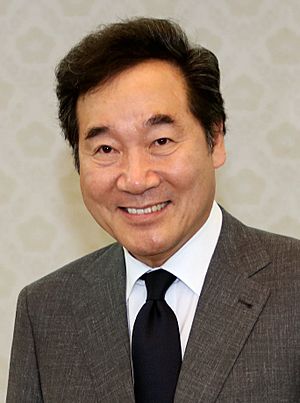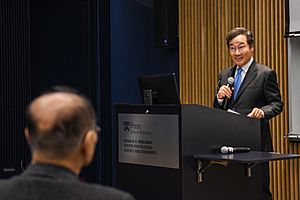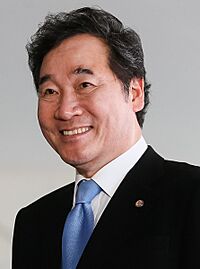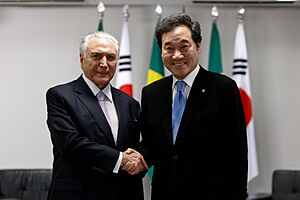Lee Nak-yon facts for kids
Quick facts for kids
Lee Nak-yon
|
|
|---|---|
|
이낙연
|
|

Lee in 2017
|
|
| Leader of the New Future Party | |
| Assumed office 4 February 2024 Co-leader with Kim Jong-min
|
|
| Preceded by | Party established |
| Member of the National Assembly | |
| In office 30 May 2020 – 15 September 2021 |
|
| Preceded by | Chung Sye-kyun |
| Succeeded by | Choi Jae-hyung |
| Constituency | Seoul – Jongno |
| In office 30 May 2000 – 15 May 2014 |
|
| Preceded by | Kim In-gon |
| Succeeded by | Lee Gae-ho |
| Constituency | South Jeolla Province – Damyang, Hampyeong, Yeonggwang and Jangseong |
| Prime Minister of South Korea | |
| In office 31 May 2017 – 14 January 2020 |
|
| President | Moon Jae-in |
| Deputy | Kim Dong-yeon Kim Sang-gon Yoo Eun-hae Hong Nam-ki |
| Preceded by | Hwang Kyo-ahn Yoo Il-ho (Acting) |
| Succeeded by | Chung Sye-kyun |
| Leader of the Democratic Party | |
| In office 29 August 2020 – 9 March 2021 |
|
| Preceded by | Lee Hae-chan |
| Succeeded by | Kim Tae-nyeon (acting) Song Young-gil |
| Governor of South Jeolla Province | |
| In office 1 July 2014 – 10 May 2017 |
|
| Preceded by | Park Jun-young |
| Succeeded by | Kim Yung-rok |
| Personal details | |
| Born | 20 December 1951 Yeonggwang, South Korea |
| Political party | New Future |
| Other political affiliations |
Democratic (2015–2024) New Reform (2024) |
| Spouse | Kim Suk-hee |
| Children | 1 |
| Education | Seoul National University (LLB) |
| Signature | |
| Korean name | |
| Hangul |
이낙연
|
| Hanja |
李洛淵
|
| RR | I Nakyeon |
| MR | I Nagyŏn |
Lee Nak-yon (Korean: 이낙연; Hanja: 李洛淵; born December 20, 1951) is a South Korean politician. He served as the 45th prime minister of South Korea from 2017 to 2020. A prime minister is like the main helper to the president, making sure the government runs smoothly.
Before becoming prime minister, Lee was the governor of South Jeolla Province from 2014 to 2017. He also worked as a journalist for more than 20 years and was elected to the National Assembly four times. The National Assembly is where South Korea's laws are made.
President Moon Jae-in chose Lee to be prime minister. This fulfilled a promise President Moon made during his campaign. As prime minister, Lee was known for being a good communicator and for having strong discussions with leaders of other political parties.
Many people thought he might run for president in 2022, especially after he won an important election in 2020. However, he did not win his party's nomination.

Contents
Early Life and Education
Lee Nak-yon was born on December 20, 1951, in Yeonggwang County, located in South Jeolla Province. After graduating from the famous Seoul National University with a degree in law, he worked for a short time at a company that managed investments.
For 21 years, from the late 1970s until 2000, he was a journalist for a major newspaper called Dong-a Ilbo. From 1989 to 1993, he was a reporter in Tokyo, Japan. During that time, he reported on the start of the reign of the new Japanese emperor, Akihito.
Start of His Political Career
Lee began his career in politics in 2000. He was inspired by former president Kim Dae-jung, whom he had met while working as a reporter. After leaving his job at the newspaper, he was elected to the National Assembly and served for four terms.
In 2002, he was a spokesperson for Roh Moo-hyun after Roh was elected president. Lee even wrote the speech that President Roh gave at his inauguration.
Lee is known for having good relationships with politicians in Japan and speaks Japanese fluently. In 2014, he left the National Assembly to run for governor of South Jeolla Province, and he won the election. As governor, he was very popular and helped bring new businesses to the area. He also started a program called the "100 won taxi" to help people in rural areas travel more easily.
Prime Minister of South Korea
 |
|
|
Premiership of Lee Nak-yon
|
|
|---|---|
| May 31, 2017 – January 14, 2020 | |
| President | Moon Jae-in |
| Cabinet | Full list |
| Party | Democratic |
| Seat | Sejong City |
|
← Hwang Kyo-ahn • Chung Sye-kyung →
|
|
 |
|

On his first day as president, Moon Jae-in nominated Lee to be his prime minister. Lee accepted and left his job as governor.
During his time as prime minister, Lee dealt with many important issues. On June 25, 2017, he called on North Korea to release its prisoners. On August 16, he spoke out against the idea of South Korea getting its own nuclear weapons. He said it would make it harder to ask North Korea to give up its weapons.
In November 2017, Lee also expressed concern that digital currencies, or cryptocurrencies, were being used for illegal activities and were creating problems for young people.
When he left office in January 2020, he was the longest-serving prime minister in South Korea since the country's constitution was last changed in 1987.
Leader of the Democratic Party
In the 2020 election, Lee won a seat in the Jongno district of Seoul, defeating another major politician, Hwang Kyo-ahn. He became a very important leader in his party, the Democratic Party. He helped lead the party's campaign and also headed a committee to handle the COVID-19 pandemic.
In August 2020, he was elected as the leader of the Democratic Party. As leader, he worked with the government to provide aid to people most affected by the pandemic. He also created special teams within the party to focus on important topics like the economy, youth issues, and safety.
However, in April 2021, his party did not do well in local elections. This led to some members of his party suggesting he should not run for president.
Presidential Campaigns
Lee was a major candidate for the Democratic Party's nomination in the 2022 South Korean presidential election. On March 9, 2021, he stepped down as party leader to focus on his campaign.
On October 10, 2021, he lost the party's primary election to Lee Jae-myung. Lee Nak-yon came in second place. At first, his team questioned the results, but he later accepted the outcome and promised to help his party in the election.
In 2024, Lee became a leader of the new New Future Party.
Personal Life
Lee is married and has one son. His family name, Lee, comes from the Jeonju Yi clan, which was the royal family of the Joseon Kingdom. He is a descendant of a prince who was the older brother of King Taejo of Joseon, the founder of the kingdom. He is a member of the Presbyterian Church in South Korea.
Electoral History
| Election | Year | Post | Party Affiliation | Votes | Percentage of votes | Results |
|---|---|---|---|---|---|---|
| 16th General Election | 2000 | Member of National Assembly from Hampyeong and Yeonggwang Counties | Democratic Party (2000) | 37,863 | 60.20% | Won |
| 17th General Election | 2004 | Member of National Assembly from Hampyeong and Yeonggwang Counties | Democratic Party (2000) | 30,123 | 55.28% | Won |
| 18th General Election | 2008 | Member of National Assembly from Hampyeong, Yeonggwang and Jangseong Counties | Democratic Party (2008) | 42,950 | 67.93% | Won |
| 19th General Election | 2012 | Member of National Assembly from Damyang, Hampyeong, Yeonggwang and Jangseong Counties | Democratic United Party | 63,887 | 77.32% | Won |
| 6th Local Election | 2014 | Governor of South Jeolla Province | New Politics Alliance for Democracy (NPAD) | 755,036 | 77.96% | Won |
| 21st General Election | 2020 | Member of National Assembly from Jongno | Democratic Party | 54,902 | 58.38% | Won |
| 22nd General Election | 2024 | Member of National Assembly from Gwangsan District | New Future Party | 17,237 | 13.84% | Lost |
See also
 In Spanish: Lee Nak-yeon para niños
In Spanish: Lee Nak-yeon para niños
 | Dorothy Vaughan |
 | Charles Henry Turner |
 | Hildrus Poindexter |
 | Henry Cecil McBay |

